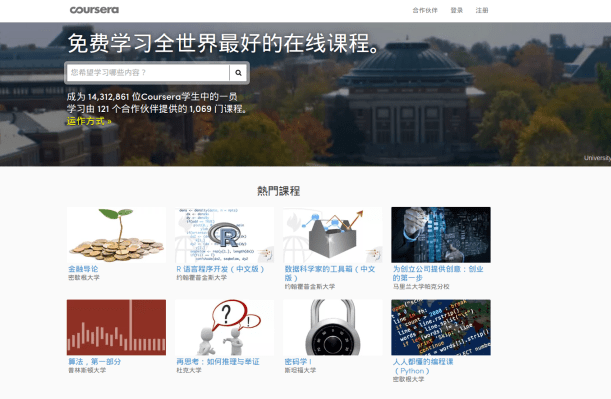Coursera announced in July that they crossed 1 million registrations as China became their second largest market, overtaking India. Most U.S. consumer Internet companies have a hard time breaking into China.
Cultural differences and the Internet firewall are a huge barrier to entry. Even tech giants like Google, Facebook and Twitter have pulled out or found themselves on the wrong side of the Chinese firewall. So how did Coursera, a relatively young company, achieve this significant milestone?
Partnerships, Partnerships, Partnerships
“Partnerships are more critical in China than anywhere else in the world” — Eric Feng, CTO Flipboard @ KPCB CEO Workshop
To increase their China footprint, Coursera has partnered with a number of local companies and universities. The local partnerships usually revolve around two things: translations and distribution.
To localize the website and translate its content, Coursera partnered with Guokr, a Chinese social networking site, and Yeeyan, a translation community.
For distribution, Coursera partnered with NetEase to create a Coursera Zone on 163.com, a NetEase-hosted, Chinese-language portal to Coursera.org. To improve performance for its Chinese users, Coursera also stores local copies of its videos on NetEase servers.
Earlier this year, Coursera announced a partnership with Hujiang, China’s largest Internet learning platform. Coursera plans to build its own online identity and community within the Hujiang platform in order to access its 80 million active users.
Coursera has five partner universities in China: Fudan, Shanghai Jiao Tong, Peking, Xi’an Jiaotong and Nanjing. Combined, these universities offer more than 50 courses, most of them in Chinese. In all, Coursera has more than 125 courses in Chinese (native + translations) on its platform.
A Credible Connection
Before becoming the CEO of Coursera, Rick Levin was the President of Yale University, serving the longest tenure in the school’s history. One of the hallmarks of his tenure was cultivating relationships internationally, especially in Asia, and particularly with China.
Under his presidency, Yale conducted a number of joint initiatives with and for Chinese universities, including helping establish international work/study programs in Beijing, and hosting a university leadership program for leaders from 14 of China’s top universities.
Levin met two Chinese presidents (Jiang Zemin and Hu Jintao), has an honorary appointment at Fudan University and was elected to the board of the National Committee on United States-China Relations.
Thus, Rick Levin brought connections and credibility to his role at Coursera with respect to its China strategy. It would probably not have been difficult for him to initiate conversations at the very highest levels at prestigious universities, but more important is his experience in working with university and government leaders on issues that were important to them.
Concerns
When the NetEase partnership was announced, a small number of Coursera’s partner institutions opted out of the arrangement. Penn, which owns an equity stake in Coursera was one of those universities.
Penn was concerned about political and academic freedom and wanted to proceed cautiously. It seems that Penn’s concerns were addressed and now their courses are available on NetEase. In fact, Wharton just launched their Business Foundations specialization in the Chinese language.
A few university leaders in China were concerned about “foreign ideas” being imported via MOOCs (Massive Online Open Courses). There were also concerns of MOOCs, by virtue of being cheaper, might cause the collapse of physical universities.
The Ministry of Education is moving forward with MOOCs, and is encouraging higher-education institutes in China to create more of them. The ministry also plans to “set up an inspection system to supervise the teaching process and operation of the platforms, preventing harmful information from being disseminated.”
Thanks to Charlie Chung for contributing to this story.
